Much of this text is from a blog post I wrote a couple of years ago. Not much has changed since then, at least not for the better.
So it seems like tourists coming to Spain are having a rough time of it these days with all the anti-tourist sentiment being expressed by local residents wherever they go. Or are they? Short answer… no they're not. But main stream media would like you to think so. Why? For clicks, what else? Local governments also like to push the anti-tourist “us against them” image because it lets them off the hook if they can blame the unrest on residents behaving badly rather than their own greed and ineptitude.
It was difficult for us to sum up Seville, my hometown, with just an illustration. We're used to telling stories through animation and movement. In this case, we ultimately chose to show the worst side of Sevilla, and it's nothing more than the abuse and battering that tourism is inflicting on a large city, where everything has been relegated in favour of tourism and gentrification. A city loved and cherished by its inhabitants that has given way to waves of stale tourism, who prefer salmon and avocado toast to a serranito.
~ artist Tavo Ponce
Truth is, nobody I know here (Sevilla) is anti-tourist or anti-tourism. At least no one I've talked to during the 32 years I've lived here. What we are is anti-overtourism, anti-destruction-of-our-culture, anti-loss-of-identity... and we are especially anti-losing-our-homes caused by little or no government control over this fast moving easy-money industry presently running roughshod all over Spain.
The tourist industry makes up 12% of the GDP nationwide and 13-15% in Andalucía. This is far too disproportionate. It's also a house of cards situation vulnerable to... oh, I dunno, something like another pandemic??
Let's go back to March 2020 when Spain basically shut down for months. We could barely leave our homes for about three months. At first one person per household was allowed to go 1) to the supermarket or 2) to the pharmacy. Oh, and you could take your dog out twice a day but could not stray far from home. Things slowly started opening up again in June, but the only tourism possible then, and for close to a year afterwards, was from national travellers and then later EU ones.
Everybody suffered. Sevilla had already been too heavily reliant on tourism for years. When Covid hit there were heartbreaking stories everywhere you turned. Local government stepped in to help the flailing hospitality industry by authorising “temporary” terrace licenses so they could serve people outdoors. Residents went out as much as possible to help support their neighbourhood bars, or they ordered takeaway. We were all in it together. For a while.
But here's the thing. After experiencing first hand, often with devastating outcomes, what happens when a country is overly-reliant on one fragile industry, did anyone learn anything? Hell no. In fact, after lockdown was lifted and both national and international travel resumed the tourism industry here doubled down on making us EVEN MORE RELIANT on tourism. Does this make sense to you? And again, this didn't only happen here.
Basically tourism is an easy money industry. You already have your gorgeous towns and cities, with fabulous landscapes and centuries of culture to exploit, and they're just sitting there. Sitting ducks. I mean, look what had already happened to places like Venice, Barcelona and Amsterdam even pre-Covid. All of them are now struggling to walk-back decades of tourist over saturation. Meanwhile pretty much everywhere else it's still a free for all greed fest.
But let's get back to Sevilla. Because the point of this article (yes there is one!) is to help you be a better tourist in the city that is my home. And I know you want to be because I've been working with tourists since I started my food & wine tours in 2009, and over these past 2-3 years post-lockdown (not post-pandemic, Covid is still here bitches) I've often been asked, well a lot of things.
For example, sometimes clients feel embarrassed that they are staying at an AirBnB apartment and what do I say as a resident who feels in constant fear of losing my home to this growing threat? Well, I tell them that the problem didn't start with them, and that of course if a cheaper option is there they will probably go for it. I explain that those who share the original blame are the governments and corporations that have run roughshod over all of us in order to make as much short-term profit as possible. Even if it means destroying the very thing they are promoting. In short, I try to educate people a bit while plying them with delicious food and wine.
Because while it's easy to point a finger at out of control AirBnB style holiday rentals, many of which are not legally licensed here, people often over look the proliferation of multinational corporations that have, in some cases, wiped out entire city blocks and squares here, evicting tenants and replacing what were once charming neighbourhoods full of life with “boutique hotels” and tourist apartment buildings. Commerce in these locations ends up catering to tourists and any trace of Sevilla culture is lost.
This leads to access to the centre is becoming increasingly difficult as the city council cuts bus routes in order to make the centre more “tourist friendly” with more and more pedestrianised streets, especially when there are 5-star hotels involved. I'm not against cutting down on general traffic, but at least keep public transport available for residents so they can also come in from the outlying barrios to enjoy their city centre too.
Anyhow, not letting AirBnB off the hook, just saying they aren't the only evil. But they will be the one that ends up turning your apartment building into a party house or worse. And the ones where you pick up your key from a box dangling off a window railing... what are you even thinking? Apparently new legislation is coming that will require the owner (or an employee) to greet arriving guests and check their ID, just like at any hotel. I mean, otherwise anyone could be staying there, and not necessarily the person that booked. Very risky business.
My first neighbourhood here, the Barrio Santa Cruz, where I lived for 18 years, no longer exists as a neighbourhood. Why? Because there are no neighbours there any more. Almost all of the homes there are now tourist apartments, all the little shops I remember – the corner store, the fruit and veg place, the newsagent, the bookshop – all gone. And my old street now has triple the number of tapas bar from when I moved there in 1993, all serving (you guessed it) what they think tourists want to eat.
So people come here and walk around my old barrio and marvel at its beauty, because of course the architecture remains stunning, the narrow cobblestone streets are still charming... but somehow they don't notice that there are no neighbours. Where are the children? The families out enjoying a meal? Groups of young sevillanos having a cold beer in the sunshine? Haven't they noticed that the only other people they see are other tourists just like them looking for an “authentic experience”?
Sure, there are still Spanish people working at the bars and the hotels. And you may think, well then tourism is good for them because it offers employment. Think again. Did you grow up wanting to clean hotel rooms? Do you want your son or daughter to work at low-paying dead end jobs that don't even provide a living wage? Because those are the majority of jobs created by tourism. You do not enrich us everyday people with your tourist dollars, instead we become your poorly-paid servants.
I’ve sometimes been called hypocritical for criticising over-tourism because much of my job has been based on working with tourists who visit here. Truth is, I am not affected positively by this latest tourist boom, because those are not my people. When I started with my tapas tours in Sevilla in 2009 there were just three of us offering food tours in the city – me, Roger and Sam – and it was a fun way of introducing visitors to the riches of our tapas culture while making a nice living doing something we loved. By 2015 things had changed considerably. AirBnb had a serious foothold in most cities by then, and city experiences were being exploited to the max. Suddenly there were franchise and corporate food tour companies taking over, or attempting to, offering 6-8 tours a day with groups of up to 10-12 people with their stable of “expert” guides.
I’ve never seen these companies as my “competition” as I don’t do what they are doing, and people come to me for something more personal. But I do take umbrage when I see them copying my tours, showing up in my cosy bars with a massive group and ruining the ambiance for everyone. I mean, if I dragged around a dozen people every day on a tapas tour (which is NOT how we tapeo here) I’d be a rich woman by now. So I know why they are doing it, but again it’s short-sighted greed in action.
Likewise it used to be normal to find lovely family-run tapas bars where you immediately felt at home and, even if the food was only okay and there wasn’t much of a wine choice, it didn't really matter because you went there to feel welcome. Many I knew and loved are now gone, which I know happens with time anyhow. But some are gone because they were forced out by either by misfortune or greedy landlords, with their “replacement” corporate versions continuing to use the same name and boasting “founded in 1897” on a tile outside the door. Shameless identity theft and appropriation of a family's history, but hey they did a nice reno and the place looks great. I call these Zombie Bars... they look like they're still alive but there's no heart inside. I see tourists queuing to get into these places and wonder if they knew the real history would they still be there, and would they care?
American travel guru Rick Steves recently pubished an article on the “anti-overtourism” protests in Spain, and the first thing he got right was not using the term “anti-tourist”. He also had some good advice on how to be a better tourist...
All of this speaks to the practical side of traveling to places where these protests might be happening. But for the thoughtful traveler, the protests are also a reminder to check yourself. Protests, strikes, and demonstrations can, and should, give you pause. It’s important to understand that many communities, overwhelmed by their own popularity, would actually prefer if at least some of us tourists would steer clear. Rather than feeling defensive, take this trend as an opportunity to be more mindful about how travel, and your presence, might negatively impact the places you’re visiting.
The same principles of good travel — whether to a place that’s oppressively “overtouristed,” or one that’s pin-drop quiet — remain the same: Visit with a spirit of curiosity and empathy, treating everyone you meet with respect and consideration; be conscientious, seeking to minimize your footprint by thoughtfully consuming resources; avoid contributing to congestion by considering visits to lesser-known alternatives (or going at a less busy time); and try to understand the local point of view about what constitutes a “good traveler” versus a “bad traveler,” to make sure you’re striving to be the former.
We are being constantly being fed the whole “sustainable”, “smart” and “slow” tourism tropes without any actual information about how this is being achieved. It’s more like a “wouldn’t this be a nice idea?” option without anything backing it up. Meanwhile, people are hopping on cheap flights to everywhere, pretending the Covid pandemic is over, oblivious to what is actually happening in the countries they visit (droughts, wildfires, food shortages etc) just because they feel entitled to A BIT OF SUN. Someone on Twitter actually posted the day after the evacuation of Rhodes in 2023 that they had just landed there for a few days of fun and “things didn’t look so bad”. Not a care about using up scarce resources needed by the residents at that time.
To recap. Spain does not live off tourism. Tourism lives off of us. The people who benefit the most aren't even Spanish, they're the multinational corporations running the hotels and others speculating and profiting from buying up our homes. We are left with the scraps.
Which brings me back to the title of this article... how you can be a better tourist. Well other than the obvious stuff like being courteous and respectful of different cultures and customs... how about doing a bit more research before you go somewhere? Using the very same internet that helped you find your cheap flight and AirBnB accommodation. Find out if your destination has recently gone through a three-year drought or if wild-fires have destroyed their crops and homes before you complain that you can't fill your swimming pool. And good rule of thumb if you go anywhere in southern Spain these days... please never complain to locals when it rains.
Just remember that everywhere you travel to – not just Sevilla – is not simply your holiday playground. They are all places where people live with their families and neighbours, and who have created a beautiful culture over the years, the one you want to visit. And we want you to visit! We actually enjoy meeting you. But do read up a bit before you go anywhere, don't expect the weather to be perfect just for you and show some respect for local culture and customs. Learn to at least say “please” and “thank you” in the local language and don’t expect everything should be in English just for you.
And if you are staying in a tourist apartment, a few tips…
Do not hang your laundry over the balcony
Do not stand on your balcony naked / half-naked (srsly it happens)
Speaking of half-naked, always wear a shirt in town
Do not make noise in your tourist apartment after 11 pm
Find out where the rubbish bins are and USE THEM
Also, please stop telling locals how CHEAP everything is here – it's only cheap to you, we don't make your salaries.
Sometimes it feels like we're fighting a losing battle, that Sevilla is being overrun on a daily basis by people who don't seem to give a fuck about us. Yes I know… not ALL tourists, but there are just so many now. And I am probably preaching to the choir here, because of course we are all tourists when we travel, and most of you reading are most likely very mindful travellers. So do I practice what I preach? Hell yeah, and then some. It makes the experience so much richer.
I imagined a Giraldilla still pregnant with Hope, but now without the coat of arms that serves as a weather vane for a city that seems to have surrendered and is wandering aimlessly. One that still clings to the palm frond as a symbol of an imagined victory for a Sevila that has no other triumph than remaining in love with itself. That watches as generations pass by, drunk on love, nostalgia, and melancholy, settled into that eternal feeling of the Sevillas we have lost. And now she is forced to look for a seat among the checked luggage of the tourists who invade her en masse, along with the young people who have to leave like swallows.
~ artist Pablo Travasos
Just as travel is a wonderful way to open up your mind and heart to new experiences, having visitors from other countries can help people here understand your cultures better too. But that’s also up to you. It's a two-way street. Always. So please tread softly when you come to visit us in Sevilla, because those are our dreams under your feet (and wheelie suitcases).




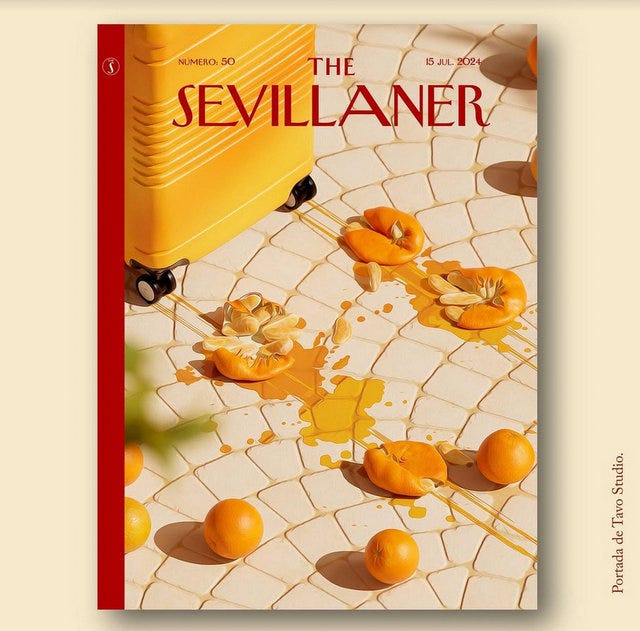

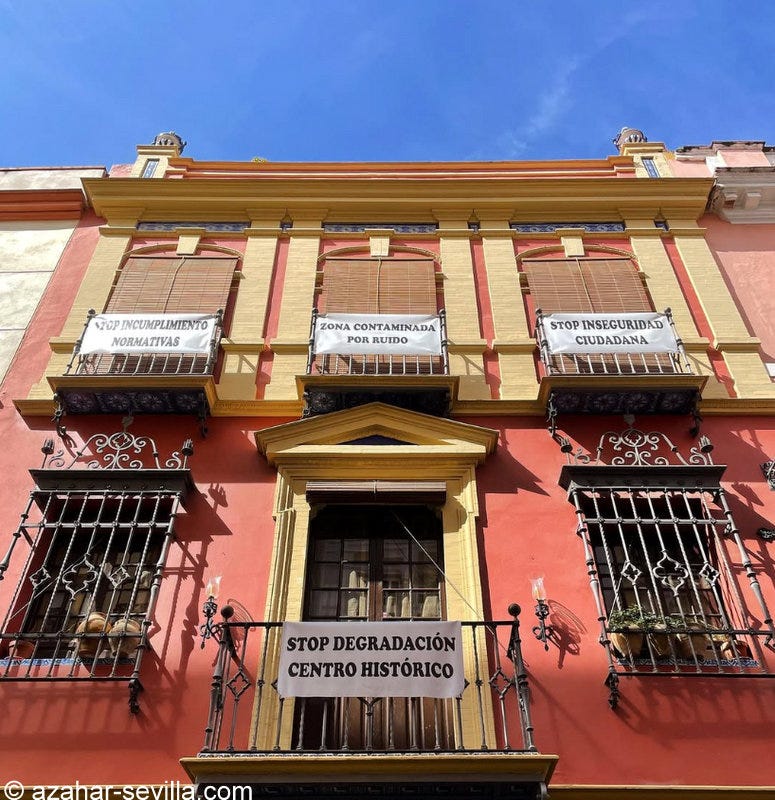
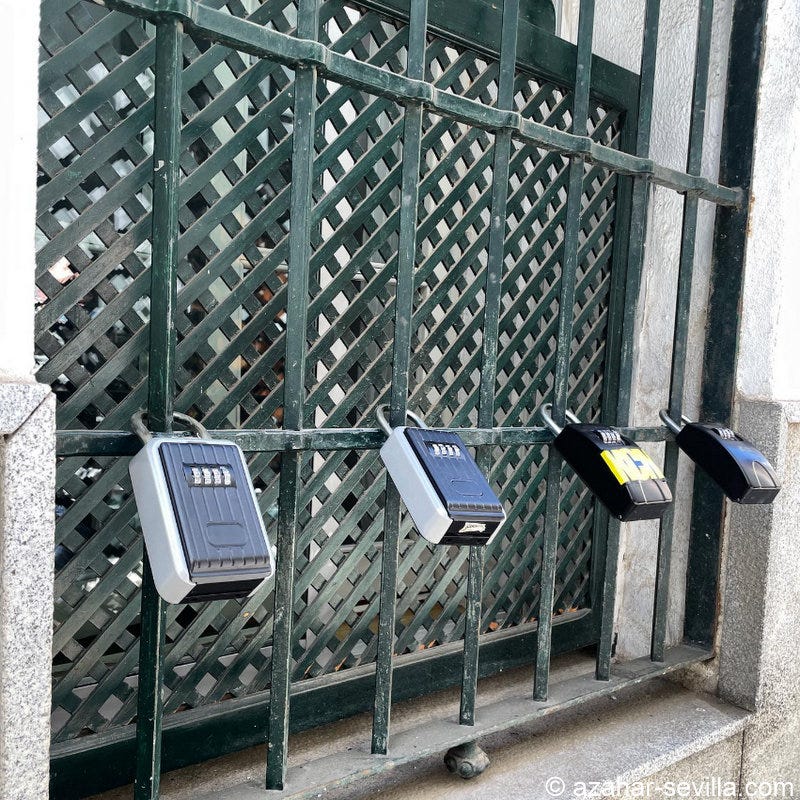
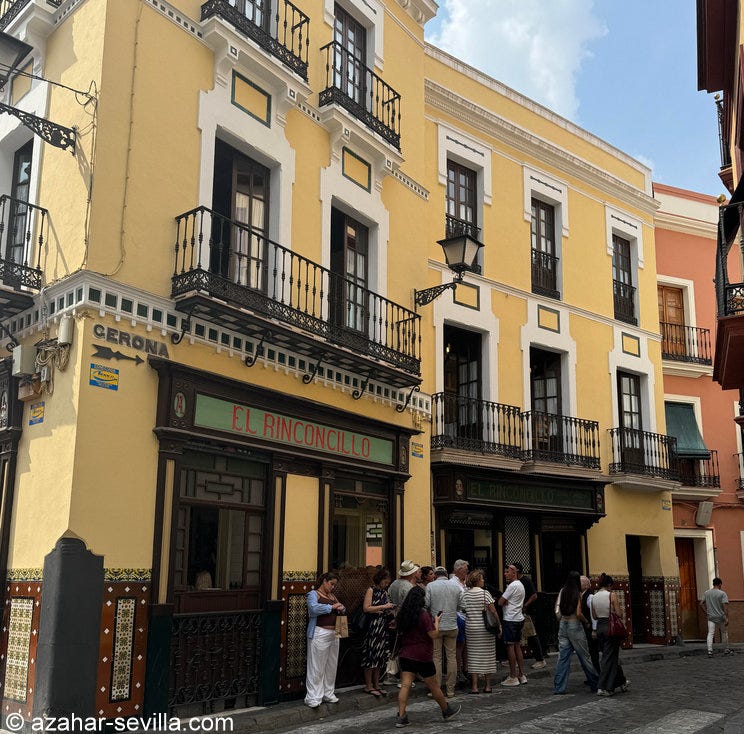
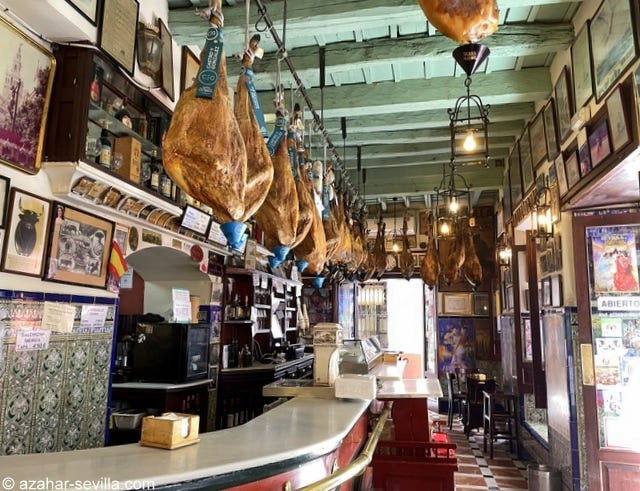
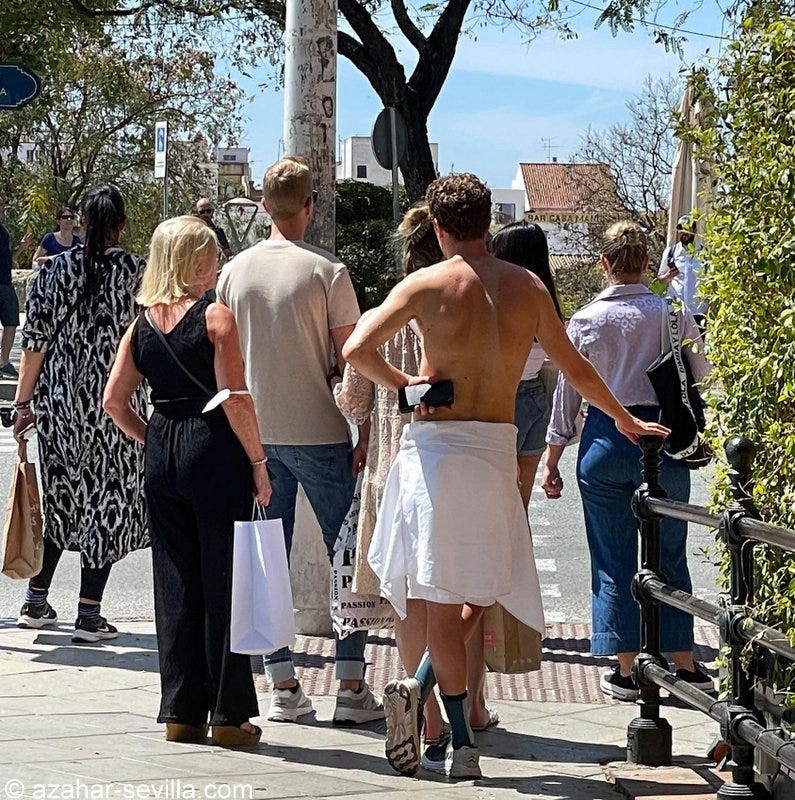
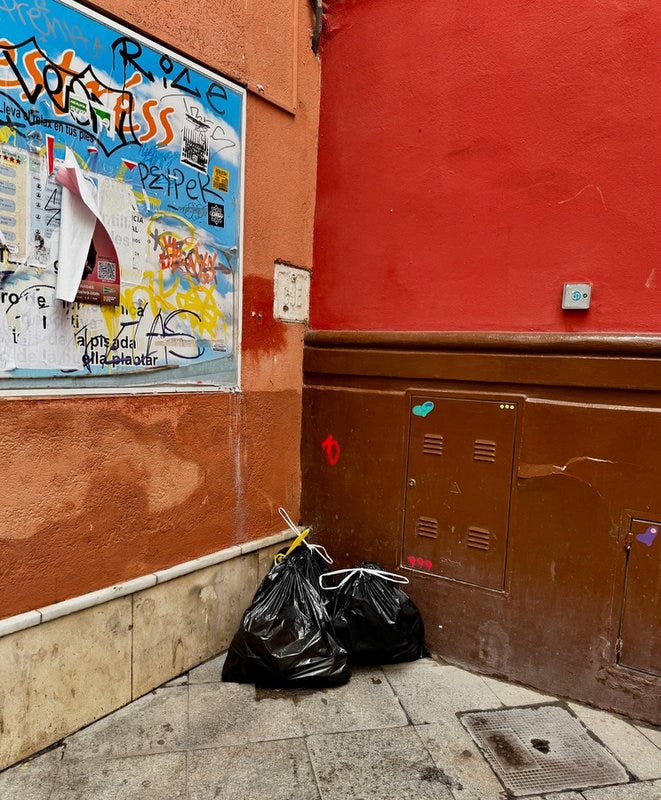

Astute and well-observed, as ever. One thing I noticed in Córdoba (and will probably notice in Sevilla, perhaps amped up to eleven) is the omnipresence of too-large walking tour groups literally everywhere in the historic centre. Ironically they make life so much harder for solo travellers like me - trying to get into and appreciate the sinagoga was awful because there were three groups, all with their guides yapping. But it’s the way they work off the idea of cities as things to be *consumed*, as quickly as possible, that really grates. (I say this as a one-time Parisian and a regular return visitor…)
Wonderful article.
Hard-hitting but it needs to be.
Visitors to Spain 🇪🇸, or anywhere, will be rewarded many times over by showing respect and an appreciation for the culture and architecture that has taken so long to create.
So glad you’ve said this and the manner in which you have.